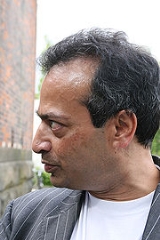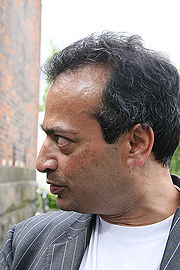
JP Rangaswami
Encyclopedia

United Kingdom
The United Kingdom of Great Britain and Northern IrelandIn the United Kingdom and Dependencies, other languages have been officially recognised as legitimate autochthonous languages under the European Charter for Regional or Minority Languages...
. He studied Economics and Statistics at the renowned St. Xavier's College
St. Xavier's College, Calcutta
St. Xavier's College is located in Kolkata, India, and is named after St. Francis Xavier, a Jesuit saint of the 16th century, who travelled to India. It is an autonomous college affiliated to the University of Calcutta. It gained autonomy in July 2006, thus becoming the first autonomous college of...
, University of Calcutta
University of Calcutta
The University of Calcutta is a public university located in the city of Kolkata , India, founded on 24 January 1857...
, specializing in developmental economics. Originally an economist and financial journalist, he has worked with technology in finance since 1980 with a number of large multinationals. He was named CIO of the Year by Waters Magazine in 2003, and CIO Innovator of the Year by the European Technology Forum in 2004. In 2007 & 2008, JP was selected as one of technology's 50 most influential individuals in the silicon.com Agenda Setters poll. JP was chosen for "vision and innovation rarely seen in CIOs." He is today Chief Scientist for salesforce.com
Salesforce.com
Salesforce.com is an enterprise cloud computing company headquartered in San Francisco that distributes business software on a subscription basis. Salesforce.com hosts the applications off-site...
. Prior to joining salesforce.com he was Chief Scientist at British Telecom and before that Global CIO at Dresdner Kleinwort Wasserstein. He is a Fellow of both the Royal Society of Arts
Royal Society of Arts
The Royal Society for the encouragement of Arts, Manufacturers and Commerce is a British multi-disciplinary institution, based in London. The name Royal Society of Arts is frequently used for brevity...
and the British Computer Society
British Computer Society
The British Computer Society, is a professional body and a learned society that represents those working in Information Technology in the United Kingdom and internationally...
.
JP is an outspoken advocate of open source and using emerging and disruptive technologies
Disruptive technology
A disruptive technology or disruptive innovation is an innovation that helps create a new market and value network, and eventually goes on to disrupt an existing market and value network , displacing an earlier technology there...
to improve information sharing, education and collaboration. While at Dresdner Kleinwort he chaired their Technology Incubator, where he oversaw the creation and spinoff of a number of startups, including openadaptor https://www.openadaptor.org/, yolus http://www.yolus.com/, sold to Ion Trading http://www.iontrading.com/index.php?module=solutions§ion=solutionsrisk and aspelle.com. He also helped set up, and later chaired, Webtek, an Indian software development company.
He is currently chairman of Ribbit http://www.ribbit.com/, a startup focused on transforming telcos, and of School of Everything
School of Everything
School of Everything is an internet startup company founded in 2006 and based in London, UK. The purpose of School of Everything is to "connect people who can teach with people who want to learn" .-Company:...
which brings teachers and students together in a disruptive way.
In April 2010 he was ranked 18th in the Wired 100, a list of the most influential "digital powerbrokers" voted by Wired Magazine.
JP is also a popular and irrepressible blogger. On Confused of Calcutta he states the following credo:
- I believe that it is only a matter of time before enterprise software consists of only four types of application: publishing, search, fulfillment and conversation. I believe that weaknesses and corruptions in our own thinking about digital rights and intellectual property rights will have the effect of slowing down or sometimes even blocking this from happening.
- I believe we keep building layers of lock-in that prevent information from flowing freely, and that we have a lot to learn about the right thing to do in this respect. I believe identity and presence and authentication and permissioning are in some ways the new battlegrounds, where the freedom of information flow will be fought for, and bitterly.
- I believe that we do live in an age of information overload, and that we have to find ways of simplifying our access to the information; of assessing the quality of the information; of having better tools to visualise the information, to enrich and improve it, of passing the information on.
- I believe that Moore’s Law and Metcalfe's Law and Gilder’s LawGeorge GilderGeorge F. Gilder is an American writer, techno-utopian intellectual, Republican Party activist, and co-founder of the Discovery Institute...
have created an environment where it is finally possible to demonstrate the value of information technology in simple terms rather than by complex inferences and abstract arguments. - I believe that simplicity and convenience are important, and that we have to learn to respect human time.
- I believe we need to discuss these things and find ways of getting them right.
He is working on a number of books at present, focused on management, technology and food.

